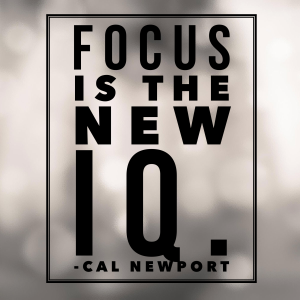 Email. Endless email. Phone calls. Texts. State-driven initiatives such as “educator effectiveness,” assessment, new standards, grant applications, data verification and reporting. Meetings. Too many unfocused, unnecessary meetings.
Email. Endless email. Phone calls. Texts. State-driven initiatives such as “educator effectiveness,” assessment, new standards, grant applications, data verification and reporting. Meetings. Too many unfocused, unnecessary meetings.
Does this look and sound like your world as a school leader?
Enter Cal Newport’s newest book, Deep Work: Rules for Focused Success in a Distracted World. Education sure has it’s fair share of distraction! I learned about this book listening to an episode of The Accidental Creative podcast and made connections to our work as school leaders.
What is deep work?
Professional activities, performed in a state of distraction-free concentration, that push your cognitive capabilities to their limit. These efforts create new value, improve your skill and are hard to replicate.
The corollary to deep work is shallow work.
Non-cognitively demanding logistical-style tasks often performed while distracted. These efforts tend to not create much new value in the world and are easy to replicate.
Newport contends that in a networked world, driven by distraction, we are increasingly replacing deep work with shallow work. While deep work becomes less and less common, it is becoming more and more valuable since it cannot be automated. In our highly regulated world of public education, I see many of us leaders falling into the trap of feeling “busy” but doing only shallow work.
During the podcast interview, Newport makes another important distinction between deep work and shallow work: deep work is a skill that is developed through focused practiced. It is not a habit that comes naturally like those associated with shallow work.
Having only listened to the podcast and not read the book (yet!), I asked myself the question: How do I make time for deep work while ensuring the necessary shallow work gets done? Doing the shallow work helps me keep my job, but it doesn’t move me or my district forward. Innovation can only happen in the margin, the white space, that space we make for deep thinking. If we want to be innovative school leaders, we have to make the time to develop our skill of deep work. So how do I go about developing the skill of deep work? Here are my 4 steps for breaking free from the shallow work of school leadership:
1. Be self-aware. What kinds of work are you doing? Take a typical week and look through your calendar. What is the ratio of deep work to shallow work? How do you feel about this ratio? Would you like to do more deep work and less shallow work?
2. Say NO to shallow work. Make a list of your shallow work for the week. What can you eliminate, automate or delegate? (This idea comes from Rory Vaden’s Focus Funnel.) See how much time you can create in your week by clearing out some of the shallow work.
3. Block off time for deep work. If it doesn’t get scheduled, it won’t get done. I have found blocking out time to be particularly useful to ensure I don’t lose deep work time to shallow tasks. It’s all too easy for that to happen! So block out time on your calendar before the week gets started.
4. Find a collaborator. This is not only for accountability purposes, but we know that creativity is most effective when we collaborate and share the process with others. (Check out two episodes from TLTalkRadio on creativity and the importance of finding a collaborator.)
How do you make time for deep work? If “focus is the new IQ,” how are we teaching our learners this valuable skill in an age of distraction?
In a future post, we’ll look at ideas for approaching deep work to create new value in your leadership.
Connect with Randy on Twitter and on the TLTalkRadio podcast!
- A silver lining - January 22, 2022
- Is our use of tech working against us? 🤔 - September 8, 2021
- What’s NOT going to change in the next 10 years? 🤔 - September 7, 2021
Great post. The shallow work can be absorbing…the calendar, the emails… But the real work, not that deserves our focus, for sure. Thanks